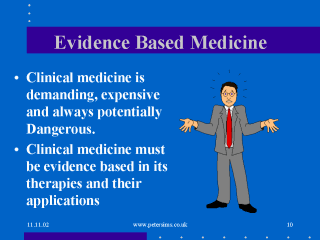| front |1 |2 |3 |4 |5 |6 |7 |8 |9 |10 |11 |12 |13 |review |
 |
Increasingly
practice is determined by the evidence base. This may be complete or more often partial. Today there is much more agreement on best treatment regimes, diagnostic work ups and care pathways.There is less room for individual idiosyncrasy or major deviation from agreed guidelines. Clinical freedom is a two edged sword-one manís clinical freedom is anotherís shortage of essentials. Agreed protocols for first and second line management of the more common conditions are helpful in enabling resources to be planned in advance, beds to be used efficiently and clinical outcomes improved. It provides for a transparent audit trail too. Because the evidence base is incomplete it is important for clinicians to be involved in large trials of therapy. Often only large numbers of patients enrolled within a Randomised Controlled trial can hope tp provide definitive answers to effective therapy. Thus patients may need to be recruited across several hospitals and often across countries too. |